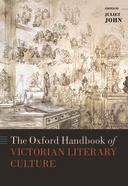 The Oxford Handbook of Victorian Literary Culture
The Oxford Handbook of Victorian Literary Culture
Contents
-
-
-
-
-
-
-
-
-
-
Poetry Poetry
-
Fiction Fiction
-
Drama? Drama?
-
Conclusion Conclusion
-
Select Bibliography Select Bibliography
-
-
-
-
-
-
-
-
-
-
-
-
-
-
-
-
4 The Literature of Chartism
Get accessIan Haywood is Professor of English at the University of Roehampton. Among his books are The Revolution in Popular Literature: Print, Politics and the People 1790–1860 (2004), Romanticism and Caricature (2013) and three edited volumes of Chartist fiction for Routledge. He is co-editor of Spain and British Romanticism (2018) and Romanticism and Illustration (2019). His most recent book, will be The Rise of Victorian Caricature (2020), is a study of radical caricature in the 1830s and 1840s.
-
Published:02 September 2014
Cite
Abstract
This chapter surveys and assesses the growing critical interest in the literature of Chartism. One of the most remarkable aspects of Britain’s first mass democratic movement was its significant output of creative literature. From the late 1830s to the early 1850s Chartist newspapers and periodicals published thousands of poems and a substantial amount of shorter and longer fiction. All this literature—whether written by anonymous and forgotten supporters or by more established Chartist authors such as Thomas Cooper, Ernest Jones and George W. M. Reynolds—combined a passionate commitment to political reform with a striving for new imaginative forms, voices, and narratives. Chartism mounted a direct challenge to the middle- and upper-class domination of both politics and literature, and it is this interweaving of radical politics and aesthetics that has continued to attract scholarly attention.
Sign in
Personal account
- Sign in with email/username & password
- Get email alerts
- Save searches
- Purchase content
- Activate your purchase/trial code
- Add your ORCID iD
Purchase
Our books are available by subscription or purchase to libraries and institutions.
Purchasing information| Month: | Total Views: |
|---|---|
| October 2022 | 8 |
| November 2022 | 2 |
| December 2022 | 13 |
| January 2023 | 3 |
| February 2023 | 7 |
| March 2023 | 12 |
| April 2023 | 4 |
| May 2023 | 5 |
| June 2023 | 2 |
| July 2023 | 2 |
| August 2023 | 5 |
| September 2023 | 7 |
| October 2023 | 8 |
| November 2023 | 8 |
| December 2023 | 4 |
| January 2024 | 6 |
| February 2024 | 8 |
| March 2024 | 3 |
| April 2024 | 1 |
| May 2024 | 10 |
| June 2024 | 6 |
| July 2024 | 2 |
| August 2024 | 11 |
| September 2024 | 2 |
| October 2024 | 4 |
| November 2024 | 11 |
| December 2024 | 3 |
| January 2025 | 12 |
| February 2025 | 10 |
| March 2025 | 7 |
| April 2025 | 7 |
| May 2025 | 2 |
Get help with access
Institutional access
Access to content on Oxford Academic is often provided through institutional subscriptions and purchases. If you are a member of an institution with an active account, you may be able to access content in one of the following ways:
IP based access
Typically, access is provided across an institutional network to a range of IP addresses. This authentication occurs automatically, and it is not possible to sign out of an IP authenticated account.
Sign in through your institution
Choose this option to get remote access when outside your institution. Shibboleth/Open Athens technology is used to provide single sign-on between your institution’s website and Oxford Academic.
If your institution is not listed or you cannot sign in to your institution’s website, please contact your librarian or administrator.
Sign in with a library card
Enter your library card number to sign in. If you cannot sign in, please contact your librarian.
Society Members
Society member access to a journal is achieved in one of the following ways:
Sign in through society site
Many societies offer single sign-on between the society website and Oxford Academic. If you see ‘Sign in through society site’ in the sign in pane within a journal:
If you do not have a society account or have forgotten your username or password, please contact your society.
Sign in using a personal account
Some societies use Oxford Academic personal accounts to provide access to their members. See below.
Personal account
A personal account can be used to get email alerts, save searches, purchase content, and activate subscriptions.
Some societies use Oxford Academic personal accounts to provide access to their members.
Viewing your signed in accounts
Click the account icon in the top right to:
Signed in but can't access content
Oxford Academic is home to a wide variety of products. The institutional subscription may not cover the content that you are trying to access. If you believe you should have access to that content, please contact your librarian.
Institutional account management
For librarians and administrators, your personal account also provides access to institutional account management. Here you will find options to view and activate subscriptions, manage institutional settings and access options, access usage statistics, and more.